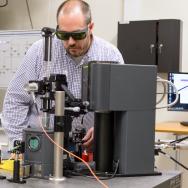Scientists with the Chicago Quantum Exchange (CQE) at the University of Chicago’s Pritzker School of Molecular Engineering announced today that for the first time they’ve connected the city of Chicago and suburban labs with a quantum network—nearly doubling the length of what was already one of the longest in the country. The Chicago network, which will soon be opened to academia and industry, will become one of the nation’s first publicly-available testbeds for quantum security technology.
The network is now actively running quantum security protocols using technology provided by Toshiba, distributing quantum keys over optic cable at a speed of over 80,000 quantum bits per second between Chicago and the western suburbs. Toshiba’s participation in the project makes the Chicago network a unique collaboration between academia, government and industry.
Researchers will use the Chicago network to test new communication devices, security protocols, and algorithms that will eventually connect distant quantum computers around the nation and the world. The work represents the next step towards a national quantum internet, which will have a profound impact on communications, computing, and national security.
A new 35-mile (56-kilometer) extension has built upon Argonne National Laboratory’s already 89-mile (144-kilometer) quantum loop, launched in 2020. The total network, announced today, is now composed of six nodes and 124 miles (200 kilometers) of optical fiber—transmitting particles carrying quantum-encoded information between the U.S. Department of Energy’s Argonne National Laboratory in suburban Lemont and two buildings on the South Side of Chicago, one on the UChicago campus and the other at the CQE headquarters in the Hyde Park neighborhood. It puts Chicago at the heart of one of the largest quantum networks in the country and further solidifies the region as a leading global hub for quantum research.
“The Chicago quantum network presents researchers with unprecedented opportunities to transmit quantum information in a real-world environment and push the boundaries of what is currently possible with quantum security protocols,” said David Awschalom, the Liew Family Professor in Molecular Engineering and Physics at the University of Chicago, director of the Chicago Quantum Exchange, and director of Q-NEXT, a Department of Energy National Quantum Information Science Research Center at Argonne. “This extension enables scientists from academia, industry, and government labs to collaborate on advancing our fundamental understanding of quantum communication and develop a secure quantum internet.”
“While this network is impressive in its scope, it is even more important as a testbed of experimentation into how quantum networks can be used. We look forward to working with CQE to explore the development of quantum network architectures that connect quantum sensors and computers together in new, exciting and useful ways,” said Jay Lowell, chief scientist for Boeing’s Disruptive Computing and Networks team
The rise of quantum computers represents both an enormous opportunity and a fundamental threat. Once operational, they are expected to be able to solve the kinds of problems that are nearly impossible for ordinary computers and thus easily break current encryption. In April, lawmakers in Congress introduced the Quantum Cybersecurity Preparedness Act, which prioritizes timely quantum-proof encrypting of sensitive information so that bad actors cannot steal the data now and decrypt it when stronger quantum computers become reality.
Scientists believe that quantum networks can draw upon the laws of quantum mechanics to be made virtually “unhackable.” Experts around the world have agreed that the implementation of quantum-secure communication networks is one of the most important technological frontiers of the 21st century.
Hack-proof encrypting can be done using quantum key distribution, which is the quantum security technology that was activated on the Chicago area quantum network on June 6, 2022, in a collaboration with Toshiba. Key distribution is a routine part of most internet security, but quantum technology can make it virtually impervious to hacking. In quantum key distribution, secret digital keys are distributed using quantum security protocols among parties communicating sensitive data. The quantum keys are sent through a network of optical fiber via particles of light, called photons, using the photons’ quantum properties to encode the bits that make up the keys. Any attempt to intercept the photons destroys the information they hold.
This kind of unhackable communication has applications anywhere secure communication is particularly vital, including industries such as finance, defense, voting and others.
“We’re thrilled to continue our partnership with the Chicago Quantum Exchange as trials begin on the network,” said Yasushi Kawakura, vice president of digital solutions at Toshiba. “It’s paramount that we develop quantum-proof technology to proactively defend against threats from the quantum future.”
—This story was first published by the Chicago Quantum Exchange.

